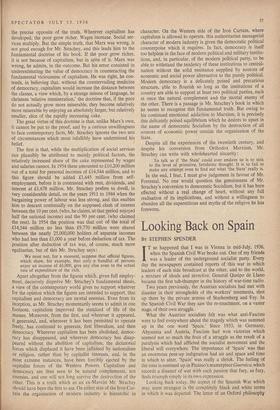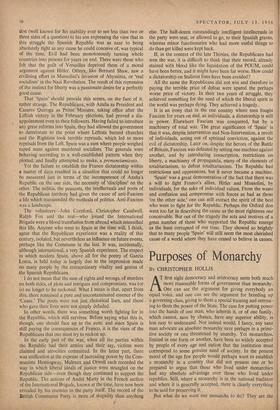Looking Back on Spain
BY STEPHEN SPENDER IT so happened that I was in Vienna in mid-July, 1936, when the Spanish Civil War broke out. One of my friends was a leader of the underground socialist party. Every day the newspapers contained reports of this war in which leaders of each side broadcast at the other, and to the world, a mixture of ideals and invective. General Queipo de Llano became the first tub-thumper in the history of war-time radio.
Two years previously, the Austrian socialists had met with disaster in their strongholds of the workers' tenements, shot up there by the private armies of Starhemberg and Fey. In the Spanish Civil War they saw the re-enactment, on a vaster stage, of their own struggle.
What the Austrian socialists felt was what anti-Fascists were to feel everywhere about the tragedy which was summed up in the one word 'Spain.' Since 1933, in Germany, Abyssinia and Austria, Fascism had won victories which seemed not so much the fruit of a struggle as the result of a paralysis which had afflicted the socialist movement and the liberal will everywhere. The importance of 'Spain' was that an enormous pent-up indignation had air and space and time in which to utter. 'Spain' was really a shriek. The feeling of the time is summed up in Picasso's masterpiece Guernica, which records a disaster of war with such passion that fury, as fury, finds triumph simply i n its own expression.
Looking back today, the aspect of the Spanish War which may seem strangest is the completely black and white terms in which it was depicted. The letter of an Oxford philosophy don (well known for his inability ever to see less than two or three sides of a question) to his son expressing the view that in this struggle the Spanish Republic was as near to being absolutely right as any cause he could conceive of, was typical of the 'time. Evil had been monotonously turning whole countries into prisons for years on end. There were those who felt that the guilt of Versailles deprived them of a moral argument against Hitler. Others, like Bernard Shaw, saw a civilising effort in Mussolini's invasion of Abyssinia, or `real socialism' in the Nazi Revolution. The result of this repression of the instinct for liberty was a passionate desire for a perfectly good cause.
That 'Spain' should provide this seems, on the face of it. rather strange. The Republicans, with Azaha as President and Casares Quiroga as Prime Minister, taking office after the Leftish victory in the February elections, had proved a dis- appointment even to their followers. Having failed to introduce any great reforms into Spain, they had allowed the government to deteriorate to the point where Leftists burned churches and the Rightists took terrible reprisals, which led to more reprisals from the Left. Spain was a sum where people weighed raped nuns against murdered socialists, The generals were behaving according to a well-established pattern when they plotted, and finally attempted to make, a pronunciamiento.
Yet the failure to establish the Franco dictatorship within a matter of days resulted in a situation that could no longer be measured just in terms of the incompetence of Azatia's Republic on the one side, the necessity of 'discipline' on the other. The militia, the peasants, the intellectuals and poets of the Republican territory had given the cause of anti-Fascism a life which transcended the methods of politics. Anti-Fascism was a landscape.
The volunteers—John Cornford, Christopher Caudwell, Ralph Fox and the rest—who joined' the International Brigade were a blood transfusion from abroad which intensified this life. Anyone who went to Spain at the time will, I think, agree that the Republican experience was a reality of this century, isolated, but nevertheless an influence on future events, perhaps like the Commune in the last. It was, incidentally, although international, a very Spanish experience. The respect in which modern Spain, above all for the poetry of Garcia Lorca, is held today is largely due to the impression made on many people by the extraordinary vitality and genius of .the Spanish Republicans.
I do not mean that the sum of rights and wrongs, of murders on both sides, of plots and intrigues and compromises, was (or is) no longer to be reckoned. What I mean is that, apart from this, there remained a pure and, uncontaminated essence of the *Cause.' The poets were not just rhetorical liars, and those who gave their lives were not simply deluded.
In other words, there was something worth fighting for in the Republic, which still survives. Before saying what this is, though. one should face up to the sum; and since Spain is still paying the consequences of Franco, it is the vices of the Republicans that one must try to reckon up.
In the early part of the war, when all the parties within the Republic had their armies and their say, victims were claimed and atrocities committed. In the latter part, there was unification at the expense of increasing power by the Com- munists. Hemingway, Malraux and Orwell each recorded the way in which liberal ideals of justice were strangled on the Republican side—even though they continued to support the Republic. The actions of Andre Marty in the French section of the International Brigade, known at the time, have now been revealed by his enemies in the party itself. The record of the British Communist Party is more of stupidity than anything else. The half-dozen outstandingly intelligent intellectuals in the party were sent, or allowed to go, to their Spanish graves, whereas minor functionaries who had more useful things to do than get killed were kept back.
If, in the context of the late Thirties, the Republicans had won the war, it is difficult to think that their record, already stained with blood like the liquidation of the POUM, could have been better, and it might have been far worse. How could a dictatorship on Stalinist lines have been avoided?
All the same the Republicans did not win and therefore in paying the terrible price of defeat were spared the perhaps worse price of victory. In their two years of struggle, they achieved something for the need of which the liberal spirit in the world was perhaps dying. They achieved a tragedy.
It is an irony that in the one country where men fought Fascism for years on end, as individuals, a dictatorship is still in power. Elsewhere Fascism was conquered, but by a machinery of total war. The great significance of 'Spain' is that it was, despite intervention and Non-Intervention, a revolt of individuals, acting out of spiritual conviction, against the evil of dictatorship. Later on, despite the heroes of the Battle of Britain, Fascism was defeated by setting one machine against another, and by introducing conscription, restrictions on liberty, a machinery of propaganda, many, of the elements of totalitarianism, to defeat totalitarianism. The Republic had restrictions and• oppressions, but it never became a machine.
`Spain' was a great demonstration of the fact that there was a will to fight Franco's allies, Hitler and Mussolini. by individuals, for the sake of individual values. From the waste and confusion and compromise with forces as bad as those 'on the other side.' one can still extract the spirit of the best who went to fight for the Republic. Perhaps the Oxford don went too far in describing the cause as the most righteous one conceivable. But out of the tragedy the acts and motives of a great number of those who supported the Republic emerge as the least corrupted of our time. They showed so brightly that to many people 'Spain' will still seem the most cherished cause of a world where they have ceased to believe in causes.



































 Previous page
Previous page